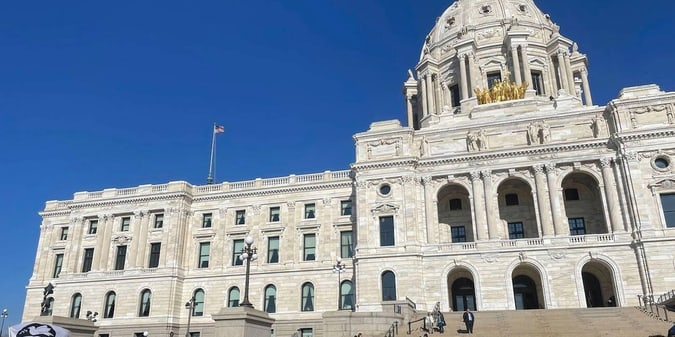In Rebuke to Racing Commission, Minnesota Moves to Ban Historical Horse Racing

The Minnesota House Commerce Committee is considering a bill to ban historical horse racing in the state, just a week after the Minnesota Racing Commission voted to legalize the games.
According to legislators on the committee, the Racing Commission overstepped its bounds by attempting to legalize the games, which are part of a broader debate on potentially allowing mobile sports betting in the state.
Historical Horse Racing: Skill Games or Slot Machines?
“Historical horse racing” is a game in which players deposit a wager into a machine that looks like a slot machine. They then can place a bet on a horse or dog race that has already occurred, with no information such as the date, location, or horses and jockeys from the race available. As time has gone on, historical horse racing machines have become more like slot machines, with some showing winnings by using spinning reels and the video of the race shown in a small corner of the screen.
Last week, the Minnesota Racing Commission legalized historical horse racing to give tracks a revenue source that they believe could be worth millions in the future. The Commission argued that skill elements make these games fundamentally different than other gaming machines. However, opponents say that historical horse racing games are essentially illegal slot machines that violate the rights of tribal nations in the state, who have the exclusive rights to full casino gaming in Minnesota.
“I think the Racing Commission took an unlawful action last week, and this bill reverses that,” Representative Zach Stephenson (DFL-Coon Rapids) said after introducing his bill to the House Commerce Committee on Monday.
The Democratic-Farmer-Labor Party (DFL) is the affiliate of the national Democratic Party in Minnesota. House Speaker Melissa Hortman (DFL-Brooklyn Park) and Majority Leader Jamie Long (DFL-Minneapolis) also sponsored Stephenson’s legislation.
“Whether we have sports betting or not, I anticipate making it extremely plain in Minnesota law that the racing commission’s decision will not stand,” Hortman said after the commission announced its move last week.
Bill Also Eliminates ‘Stadium-Style Games’
DFL members say that the Racing Commission violated state law and overreached its authority in authorizing historical horse racing at race tracks in the state. However, the racing industry says that Stephenson’s bill actually goes much further, restricting games that tracks already use to generate revenue.
Under current Minnesota law, tracks can offer up to 80 table games. However, tracks have been somewhat getting around this law by offering betting booths where players can take part in live dealer games over streaming video. These “stadium-style games,” similar to live-dealer games, can allow dozens of players to play with a single dealer, as opposed to the maximum of six or seven who can typically play at a casino blackjack table.
Stephenson’s bill would better define what represents a table, eliminating what Stephenson calls a “loophole” in the rules that currently allows the stadium-style games.
Racing industry officials have said this would cripple what tracks can offer to their customers.
“It’s one thing to create a bill that blocks a new form of gambling, but to try to outlaw nearly all the games currently played at the tracks is an obvious overreach,” Justin Revak, president of the Minnesota Horseman’s Benevolent & Protective Association, told reporters.
Tracks Fear Mobile Sports Betting Will Leave Them Behind
The debate over historical horse racing is only the latest front in a larger battle over mobile sports betting in the state. Last year, the Minnesota House passed a bill that would allow for mobile sports betting, with Native American tribes in the state having exclusive access to mobile gaming licenses.
Authors of that legislation want to see it passed this year. Both House and Senate versions of the bill now offer some subsidies to the state’s horse racing tracks to mitigate any harm the racing industry might face, with a Senate amendment moving $20 million per year to a fund to support racing, with an additional contribution of $3 million per year thereafter.
Racing officials say that such contributions – which are smaller in the House version of the sports betting bill – aren’t nearly enough to support racetracks.
“We believe this amendment provides a short-term solution to a long-term concern and problem,” Randy Sampson, CEO of Canterbury Park, told lawmakers last year.
To pass a sports betting bill, DFL proponents will probably need some Republican support to overcome resistance in their own party. Many potential GOP votes will require some concessions to the horse racing industry. But Stephenson says historical horse racing won’t be part of any deal.
“There is no universe in which any bill that leaves this committee will authorize historical horse racing at the tracks,” Stephenson said last week. “It’s a total non-starter. It will not be part of the sports betting deal.”
(Image: Trisha Ahmed / Associated Press / Alamy)
Meet The Author
Experience
Ed Scimia is an experienced writer who has been covering the gaming industry since 2008. He graduated from Syracuse University in 2003 with degrees in Magazine Journalism and Political Science. As a writer, Ed has worked for About.com, Gambling.com, and Covers.com, among other sites. He has also authored multiple books and enjoys curling competitively, which has led to him creating curling-related content for his YouTube channel, "Chess on Ice."
Read Full BioRelated News








